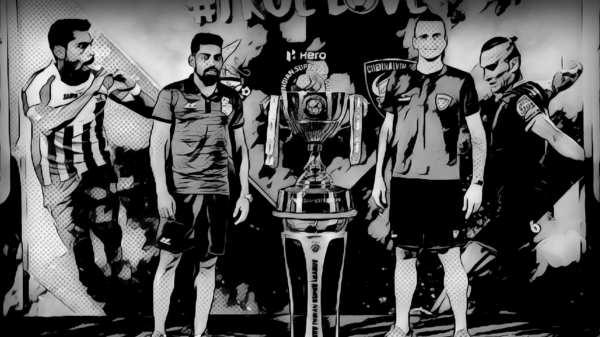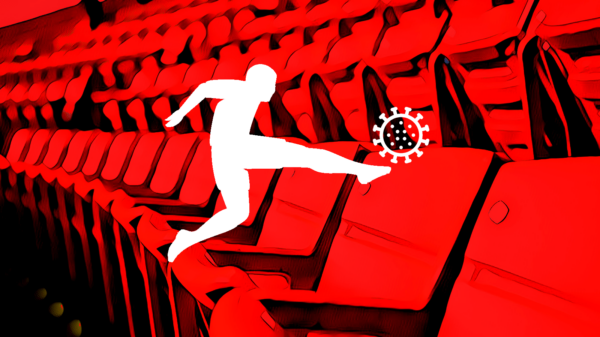Richard Pike writes in detail about what the modified football calendar for this season, and the next might look like, and what it teaches us about the football calendar as it exists.
When looking back on 2020 in future years, one memory above all others will rise above the rest, that of the ongoing coronavirus crisis. This appalling disease has touched every corner of Earth and has plunged it into arguably its greatest crisis since the Second World War. Each aspect of everyday life has been affected and restricted in a way never seen before. The hard truth about COVID19 life is that it even affects our relationships. But it is also having a negative impact on many people’s mental health – particularly in countries where a lockdown or quarantine has been out in place. There are higher reports of anxiety and depression which is unsurprising considering the isolation that everyone has been experiencing and with healthcare systems struggling, many are looking to alternative methods such as the use of CBD products to help manage their symptoms. Those wishing to try this may be interested in this Survey Research: Using CBD to Cope with Stress & Anxiety During Pandemic. The use of CBD may not work for everyone and it is always recommended that you speak to a healthcare professional before trying any new treatment, but with much success, it’s easy to see why people are seeking out these options to improve their mental health. Obviously, we know it is easier said than done, but it is important that you do your best to make sure you don’t let quarantine get you down – and there are things you can do to try and stay positive. It goes without saying that everybody’s thoughts during these difficult times go out to all those who have either experienced loss or have loved ones/friends receiving care in hospitals and other facilities. In addition, our deepest thanks and respects must be paid to all healthcare professionals everywhere looking to save lives and beat this pandemic.
2020 will go down as a “lost year” with football not-exempt from the crisis. With the exception of Belarus, every other European football league system has since mid-March suspended its action. Understandably, football’s authorities just like those in other sports are unable to give a concrete date as to when action will return. Right now peoples’ health and saving as many lives as possible are far more important. Sports events must only resume when it is deemed safe no matter how long that takes or however many precautions have to be taken.
However, as FIFA and the other continental associations weigh up a calendar to finish 2019/20 or the 2020 campaign for those leagues with a spring to autumn calendar, attention must also turn to next season. So what will the 2020/21 European football calendar look like?
Plans in place, however, there are understandable obstacles
The ceasing of all European football leagues led to an understandable near month of silence from the leagues and governing bodies. One can never be too cautious. However, over the last week, there has been evidence to suggest that many European countries are now past the pandemic’s peak. At the same time as governments have begun to ease lockdown restrictions, football’s governing bodies are tentatively discussing return dates.
On 4th May 2020, both the Premier League and La Liga outlined their return to action plans. Both are targeting a June return. Whilst La Liga were more vague, the Premier League gave more exact dates. The Premier League is planning a return to action behind closed doors on 12th June with the league season completing on 27th July. The FA Cup final would take place two weeks after this on August 8th and the new Premier League season would start on the weekend of 22nd/23rd August 2020.
This season’s Champions League will restart on 9th August with all knockout ties rumoured to be just one-legged ties and behind closed doors. The Champions League final for 2019/20 would then take place a week after the start of the 2020/21 Premier League season. This followed on from news released by UEFA who plan to finish this season’s Champions League and Europa League in the month of August with the final in Istanbul taking place on 29th August 2020.
UEFA Euro 2020 has had to be postponed until 2021. However, UEFA will have to make sure it takes place in June/July next year to ensure the 2021/22 campaign starts in its usual August slot after the disruption. Hence the proposed August 29th finish to the 2019/20 campaign. The Premier League’s proposed 2020/21 campaign on 22nd August 2020 could be adapted by other major European leagues. Such a date would enable all the current club tournaments to be fitted in and be finished for late May 2021, allowing Euro 2021 to begin two weeks later in mid-June.
Whilst one should applaud the authorities everywhere for putting together a return date and calendar, I feel that the proposals put forward are overly-optimistic. The reason being a statement made by FIFA’s medical chief Michel D’Hooghe who cautioned that competitive football should not return until September.
Mr D’Hooghe is right to be cautious about football’s return. It is worth noting that the German Bundesliga had planned to restart matches in mid May behind closed doors. However, recently 10 player tests out of 1,724 across clubs in Germany’s top two divisions have come back positive for coronavirus. These positive tests cannot be ignored and pour doubt onto all aforementioned plans by leagues of a quick return, even behind closed doors. Safety and prevention of a second pandemic is of upmost importance.
A “Worst-Case Scenario” calendar to complete 2019/20 and start 2020/21
Analysing coronavirus will remain continuous for the foreseeable future, so returning to competitive football on 1st September may prove to be a precautious “worst-case” scenario. However, let’s assume this “worse case” scenario occurs. Before things return back to normal, measurements will likely have to be put in place to protect players, staff, and fans alike. Things like effective PPE, such as protective face masks, may be required to limit the spread of the virus meaning that normal fixtures in the sporting calendar can gradually be phased in once the threat is deescalated sufficiently. Europe’s top four ranked leagues, England, Spain, Italy and Germany have between 9 and 12 league matches and between 1 and 3 rounds of cup competitions of the 2019/20 campaign to complete. There are also Champions League and Europa League fixtures from the last sixteen alongside the Quarter Finals, Semi-Finals and Final still to play.
Between 1st September and 31st October, there are 18 match-day slots available for fixtures, 9 midweek and 9 at weekends. All would have to be used to complete all the aforementioned four championships’ league and cup fixtures. The aforementioned plan of the remaining 2019/20 Champions League and Europa League games being one-legged would have to occur to have any chance of being completed within the above two month timeframe.
Think all of the above is complex? We are just getting started. The aforementioned Premier League restart plan saw the clubs have just a one week break after finishing the season on 27th July. Something similar would have to occur here. Therefore the 2020/21 “worse-case” scenario calendar would begin on the weekend of 13th-14th November 2020. If the 2021/22 season is to return to the pre-coronavirus schedule of an August start, a first weekend in June finish, a minimum four week summer break and enough space for all competitions, the latest possible start date for Euro 2021 would be the weekend of 26th/27th June.
If Euro 2021 is to start on this proposed date, the 2020/21 European football club season would have to conclude with the 2021 Champions League final on Saturday 12th June 2021, two weeks before Euro 2021 starts. It will be a European football season where everything will have to be condensed. Taking away a spell reserved between 26th December 2020 and 4th/5th January 2021 for festive fixtures, there are 29 weekend slots and 28 midweek free slots. Quite simply, as many of these fixture slots as possible must be used with only a few spare midweeks or weekends being used for player recuperation.
Already one can see in this revised calendar there is not enough for everything you would have under normal circumstances. Competitions will have to be cut. In cases like this priority will be given to competitions that are most valuable. Therefore, the first two competition casualties in the English calendar will likely be the League Cup and Football League Trophy.
Regarding the FA Cup, there are only two options. Either the competition goes ahead but with all replays scrapped and only teams from the sixth tier National Leagues North and South upwards allowed to compete as there is just not room for all the preliminary rounds. However, this would be understandably be very hard on clubs below tier six. The second option would be to scrap the FA Cup all together. However then some teams in the Premier League who haven’t qualified for Europe would with no cup competitions to play only have 38 matches in a season.
With regards to the Champions League and Europa League, fitting in all the qualifiers, group stages and knockout rounds is a non-starter. The only solution is to put both competitions back to being straight knockout for just the 2020/21 season with no group stages. Placating European football’s giant clubs may involve them only entering said competition after two or three prior rounds. Said giant clubs may still bemoan the removal of the group stages for it acts as their safety net from an early elimination. However, the coronavirus crisis means that 2020/21 could have to be a calendar of compromise and this is surely better than no competition at all.
Only two international games would be played during this calendar, those being the play-offs for the four remaining spots at the Euros. With the Euros now taking place in 2021, the 2020/21 UEFA Nations League is now rendered obsolete and needs to be scrapped. Furthermore, the limited number of slots available mean with the exception of these playoff games, there can be no international football during the 2020/21 European club season as there is no room for it.
The only complication would be the issue of player contracts. Some players will be free agents at the end of June whereas some others will have already agreed moves for 2020/21 to another team. However, given how the coronavirus crisis is a one-off, surely all parties can come to a mutual agreement to extend player contracts at current employers until when 2019/20 eventually completes?
Released players would become free agents on 1st November 2020 and those who have already agreed to sign for another club for next season would start at said new club on the same date. The “summer” transfer window would have to take place from 1st November (just after the 2019/20 season would finish) and would shut on 30th November (a couple of weeks into the worst case scenario 2020/21 campaign). The winter transfer window may well have to be scrapped altogether as it would make little sense just a month after the aforementioned “summer” window closes to have a winter transfer window like you would under normal circumstances in January.
Finishing all 2019/20 seasons is only option that avoids the possibility of legal disputes
It is worth pointing out that some domestic leagues such as France’s Ligue 1 have already declared their season finished. Clubs’ final positions and fates have been decided depending on where they finished prior to coronavirus postponing play. Recently, France’s president Emmanuel Macron declared all sport events, even those behind closed doors cancelled until September 1st.
However, the suspension of all sport until the end of August in France ties together with Mr D’Hooghe’s remarks about football not restarting until September. Therefore, rather than declare the 2019/20 Ligue 1 season finished, it should resume on 1st September like the aforementioned other leagues in the worse-case scenario and eventually complete in due course.
The problem of declaring a league season finished when there are still games to play has already manifested itself. Amiens SC were 19th and in Ligue 1’s relegation zone when it was declared finished, however, with ten games remaining, they trail 18th placed Nimes by only four points. Understandably acting on the principle that they could still catch Nimes, Amiens recently launched a petition against their enforced relegation.
Amiens also called for none of the current Ligue 1 clubs to be relegated, the top two clubs in the 2019/20 Ligue 2, Lorient and Lens promoted and the 2020/21 Ligue 1 season comprising 22 clubs. However, even this olive branch petition has its problems. In 2019/20, a French football season comprising a 20 team Ligue 1, two domestic cup competitions and European fixtures was so congested that the French Federation decided to scrap their League Cup from 2020/21 onwards.
A 22 team Ligue 1 would simply mean that the 4 midweek slots you have saved by scrapping the League Cup are simply filled up by 4 extra league matches as your season is now 42 games in length as opposed to 38 games. The French National Cup still has to be played and certain clubs have European club competition fixtures. In addition, what becomes of the structure of the remaining divisions? Ligue 2 could not remain an 18 team division as its clubs would bemoan loss of revenue from 2 fewer home league matches.
Finally, no relegation or promotion and financially compensating those clubs who would be promoted under normal circumstances with additional TV money (in the case of the Premier League, parachute payment money) has its difficulties. Even with said clubs receiving financial compensation, it may not be enough to keep their star players. Some may want to play in a higher league, their opportunity to do that with their current employer has been denied, so some may move somewhere else where they get top flight football. In addition, other clubs in the second tier could cry foul that these select few clubs would be gaining an unfair financial advantage for 2020/21 as a result of receiving these compensation payments.
Unless a drastically bad scenario occurred which prevents any chance of completing the current campaign by 31st December 2020, it is imperative that the 2019/20 league seasons are completed with all remaining games being finished. Finishing behind closed doors is preferable to not finishing at all. Finally, it denies any possibility of legal action being pursued as such scenarios can drag on and they are the last thing football needs as it like other sports emerge from this awful pandemic.
The Casualty Calendar of 2020/21 should open up debate about amount of football currently being played
Whatever happens in the upcoming weeks and months, surely a debate is needed about just how much football is being played. Is the calendar now full and by looking to add more games, are we overstretching ourselves? The disruption caused by coronavirus is a one-off. However, it shows that the European football calendar has very little wiggle room in case of crisis and a re-arranged new season has to see casualties to the normal fixture list. Both Jurgen Klopp and Pep Guardiola have in recent times criticised the amount of football being played in the calendar.
Klopp’s fury came from Liverpool forcibly playing two games in two days with two different teams in their League Cup Quarter Final against Aston Villa (which with such a young side they understandably lost) and their FIFA Club World Cup Semi Final against Mexican outfit Monterrey. Whereas Guardiola, despite domination of the League Cup competition during his time at Manchester City has called for the competition to be scrapped to ease fixture congestion.
I agree with both the Liverpool and Manchester City managers that the calendar is full. However, when we do return to a standard calendar again post Euro 2021, attempts to trim the calendar need to focus on other competitions than the League Cup. The only thing the League Cup should lose is the two-legged semi-finals. A one-legged semi-final with away goals counting after extra time for the side drawn away remedies this problem. As aforementioned, the League Cup takes up just seven midweek spots and one weekend spot in a season.
The focus should fall more on UEFA and FIFA, their current tournaments and planned future expansions to the calendar. The only competition that needs scrapping from the English calendar is the Football League Trophy which has become farcical since the introduction of Premier League and Championship “B” teams against many League One and League Two clubs’ wishes.
Completing the current Champions League and Europa League from their group stages takes up a staggering 15 midweek slots in the calendar. It used to be just 13 with the Champions League last sixteen ties being completed in a two-week timeframe. Yet just a few seasons ago UEFA decided to expand it to four weeks. This forces the Champions League final in odd-numbered years to now be played in June, robbing some players in-between seasons of necessary recuperation time and crucially taking up midweek slots that could be filled with domestic fixtures.
Then we have four international breaks over a season. A combined 12 fixture slots which leaves millions of fans everywhere frustrated at the constant stoppages to a season during the months of September, October and November. Only one international break should take place in a season, a full two week long break in October which would give space to play five international games (either qualifiers for European Championships or World Cups) all in one go.
This would have two benefits over the current situation. The first would be the prevention of the aforementioned constant interruptions to club football. Secondly, it would avoid the farcical scenario of international matches in March at the business end of the season. It is unfair with titles, European qualification and relegation on the line for clubs, through no fault of their own to lose vital players to injury whilst they are on international duty.
By doing these simple things, the season could finish earlier, meaning the remaining qualification matches for international tournaments could be played from the middle until the end of May and players get necessary recuperation time off-season. In addition, this eliminates the need for the UEFA Nations League, a tournament designed to replace international friendlies. You would only need to play international friendlies in the build-up to a European Championship or World Cup.
Then we have the nonsense of FIFA’s proposed expanded 24 team Club World Cup competition and the proposed summer tournament by UEFA designed to rival said Club World Cup. I have long held a critical view of UEFA and FIFA’s seemingly endless attempts to put player career longevity at risk.
Dealing with the aftermath of the coronavirus crisis will be a sizeable task football’s governing bodies will have to face up to. Supporting clubs at all levels in all countries financially and re-organising two season’s calendars will be first priority. However, discussing the amount of football currently being played and the risk of burnout by exposure to any additional expansion of the calendar is something football cannot ignore when the sport resumes play in the future.
- What could be the consequences of another lockout of the Champions League knockouts by Europe’s “Big Five” leagues? - November 24, 2020
- 2020-21 Serie A: U20 Young Players To Watch - September 16, 2020
- 2020-21 La Liga: U20 Young Players to Watch - September 12, 2020



























































